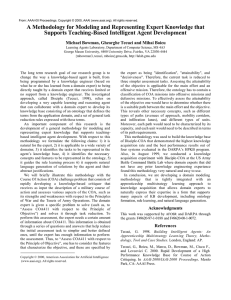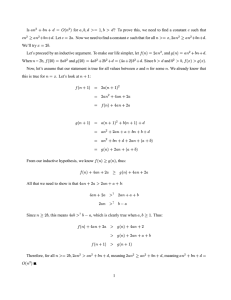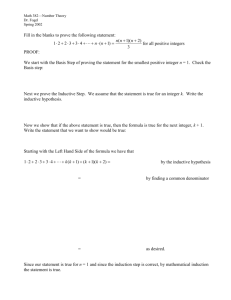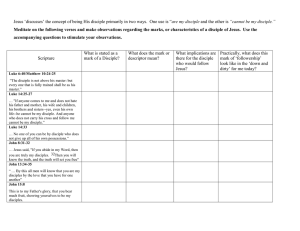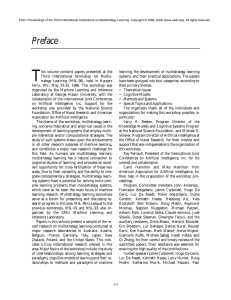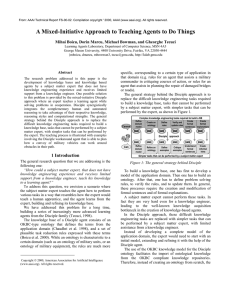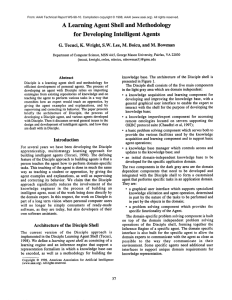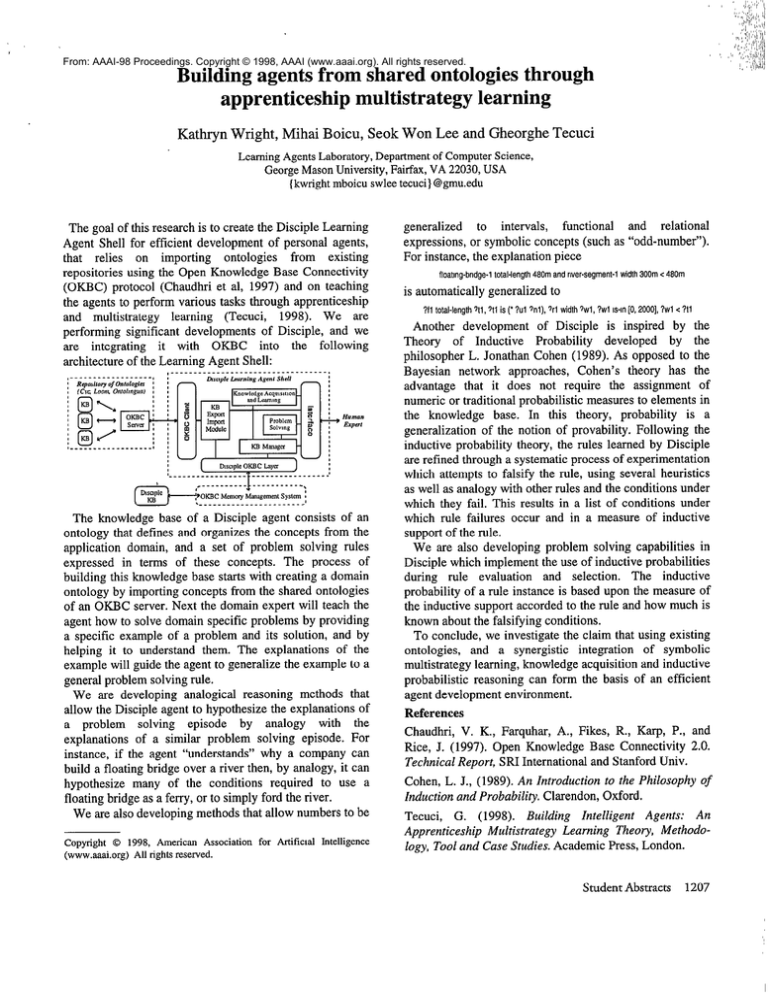
From: AAAI-98 Proceedings. Copyright © 1998, AAAI (www.aaai.org). All rights reserved.
Building agents from shared ontologies through
apprenticeship multistrategy learning
Kathryn Wright, Mihai Boicu, Seok Won Lee and Gheorghe Tecuci
Learning Agents Laboratory, Departmentof Computer Science,
George Mason University, Fairfax, VA 22030, USA
{ kwright mboicu swlee tecuci} @gmu.edu
The goal of this research is to create the Disciple Learning
Agent Shell for efficient development of personal agents,
that relies on importing ontologies from existing
repositories using the Open Knowledge Base Connectivity
(OKBC) protocol (Chaudhri et al, 1997) and on teaching
the agents to perform various tasks through apprenticeship
and multistrategy learning (Tecuci, 1998). We are
performing significant developments of Disciple, and we
are integrating it with OKBC into the following
architecture of the Learning Agent Shell:
(_ _ - _ _ _ _ _ _ __ __ _ _ - - _,
,___________________--------~------,
,
hsaplc laming Agent Shell
-
:
5D
=.:::
)
The knowledge base of a Disciple agent consists of an
ontology that defines and organizes the concepts from the
application domain, and a set of problem solving rules
expressed in terms of these concepts. The process of
building this knowledge base starts with creating a domain
ontology by importing concepts from the shared ontologies
of an OKBC server. Next the domain expert will teach the
agent how to solve domain specific problems by providing
a specific example of a problem and its solution, and by
helping it to understand them. The explanations of the
example will guide the agent to generalize the example to a
general problem solving rule.
We are developing analogical reasoning methods that
allow the Disciple agent to hypothesize the explanations of
a problem solving episode by analogy with the
explanations of a similar problem solving episode. For
instance, if the agent “understands” why a company can
build a floating bridge over a river then, by analogy, it can
hypothesize many of the conditions required to use a
floating bridge as a ferry, or to simply ford the river.
We are also developing methods that allow numbers to be
Copyright
0
1998, American Association for Artificml
(www.aaai.org)All rights reserved.
Intelligence
generalized to intervals, functional
and relational
expressions, or symbolic concepts (such as “odd-number”).
For instance, the explanation piece
floating-budge-1total-length 480m and river--segment-lwidth 300m < 480m
is automatically generalized to
?fi total-length 111,‘?I is (’ ?ul M), ?I width 7~1, ?wl Is-In [0, ZOOO],?wl < ?il
Another development of Disciple is inspired by the
Theory of Inductive Probability developed by the
philosopher L. Jonathan Cohen (1989). As opposed to the
Bayesian network approaches, Cohen’s theory has the
advantage that it does not require the assignment of
numeric or traditional probabilistic measures to elements in
the knowledge base. In this theory, probability is a
generalization of the notion of provability. Following the
inductive probability theory, the rules learned by Disciple
are refined through a systematic process of experimentation
which attempts to falsify the rule, using several heuristics
as well as analogy with other rules and the conditions under
which they fail. This results in a list of conditions under
which rule failures occur and in a measure of inductive
support of the rule.
We are also developing problem solving capabilities in
Disciple which implement the use of inductive probabilities
during rule evaluation and selection. The inductive
probability of a rule instance is based upon the measure of
the inductive support accorded to the rule and how much is
known about the falsifying conditions.
To conclude, we investigate the claim that using existing
ontologies, and a synergistic integration of symbolic
multistrategy learning, knowledge acquisition and inductive
probabilistic reasoning can form the basis of an efficient
agent development environment.
References
Chaudhri, V. K., Farquhar, A., Fikes, R., Karp, P., and
Rice, J. (1997). Open Knowledge Base Connectivity 2.0.
Technical Report, SRI International and Stanford Univ.
Cohen, L. J., (1989). An introduction to the Philosophy of
Induction and Probability. Clarendon, Oxford.
Tecuci, G. (1998). Building Intelligent Agents: An
Apprenticeship Multistrategy Learning Theory, Methodology, Tool and Case Studies. Academic Press, London.
Student Abstracts
1207

